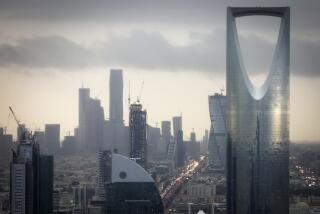Turning Swords Into Bumper Cars
KUT, Iraq — In a Disney-esque approach to guerrilla warfare, U.S. Army commanders here are hiring suspected members of a Shiite Muslim militia to help rebuild a rusted and abandoned amusement park that once drew thousands of families with its Ferris wheel, bumper cars, fountains and grassy picnic areas.
The plan may sound far-fetched. But commanders in the 2nd Armored Cavalry Regiment say it’s based on this simple premise: Enemy fighters don’t have time to fire rockets or mortar shells if they’re busy earning a living. Rebuilding the amusement park should occupy dozens of men for weeks.
“Call it ‘Six Flags Over Al Kut,’ ” quipped Col. Brad May, the regiment’s commander.
Throughout Iraq, the U.S. military is funneling more than a billion dollars into projects to fix devastated infrastructure and create jobs for unemployed Iraqis.
The Kut amusement park is the first public works effort to target suspected followers of radical Shiite cleric Muqtada Sadr.
This project carries a special significance for the military. Sadr’s forces in Kut rallied at the park before taking part in the bloody uprisings that swept south-central Iraq last month. Since then, the park has been occupied by squatters, who herd scores of goats amid pink oleanders and towering date palms. Looters have systematically dismantled the high wall, loading the bricks into dump trucks and carting them off.
Renovating the park might, in the eyes of one officer, plant peaceful thoughts in the minds of some militiamen.
“This time they’ll be here with picks and shovels instead of AKs and RPGs,” said Army Capt. Leonard Kergosian, referring to assault rifles and rocket-propelled grenades.
Of all the cities involved in the uprisings, only Kut was quickly retaken by U.S. forces. The city of a quarter-million inhabitants has remained relatively quiet since, and the local Sadr office has been reduced to a bombed-out shell.
While violence still rages in the cities of Karbala and Najaf, U.S. commanders in Kut say they’ve struck on the right combination of deadly force and economic encouragement to maintain peace.
“We carry a gun in one hand and wave with the other,” said Lt. Col. Mark Calvert, a cavalry squadron commander in Kut.
In recent days, however, there have been signs of trouble. Patrols rumbling through the city have encountered a proliferation of new Sadr posters nailed or stenciled onto walls, and two suspected militiamen died over the weekend while tinkering with a bomb in their car.
Hoping to stamp out a potential fire before it caught, Calvert thought the renovation project could help. He had already spent or planned to spend hundreds of thousands of dollars on sewer, road and school renovation projects, but the park could carry special appeal to residents. Many of its rides will have to be scrapped, but engineers hope to at least salvage its primary draw: the large, colorful Ferris wheel.
The only task that remained then was recruiting Sadr supporters for the job. That chance came last week during Friday prayers at a mosque whose members are loyal to the cleric. A patrol from the cavalry regiment stopped to talk with several security guards and arranged a meeting with one of them Monday.
That meeting took place at a popular kebab restaurant overlooking an enormous irrigation dam on the Tigris River. Over tiny glasses of tea thick with sugar, Calvert presented his offer to the Sadr contact: Fifty men would be paid $5 a day each to clean up and landscape the amusement park grounds. Two supervisors would get $15 each to oversee the work. The Army would pay $100 upfront so the supervisors could purchase landscaping equipment.
“I demand that people who work for me do a very good job,” Calvert told the contact, Kassim Khlaf. “I’ll come by every day to check on the progress. If there’s a problem, I will talk to you.”
At that point, Khlaf chuckled lightly, shook his head and said, “Abu Ghraib -- noooo.”
The work, Khlaf said, would meet Calvert’s standards, God willing. After working out several more details, Khlaf said through an interpreter that he would round up the men necessary for the work. “This is for the benefit of the residents,” he said. “They can run away from the cities and spend time in the park, under the palm trees.”
But not all of the conversation between the cavalry officer and the militia contact was quite as idyllic.
Before standing and shaking hands, Calvert asked Khlaf if he knew who was responsible for several recent violent incidents.
Khlaf knitted his eyebrows at the question. “We will leave this subject for another time,” he said.
More to Read
Sign up for Essential California
The most important California stories and recommendations in your inbox every morning.
You may occasionally receive promotional content from the Los Angeles Times.











